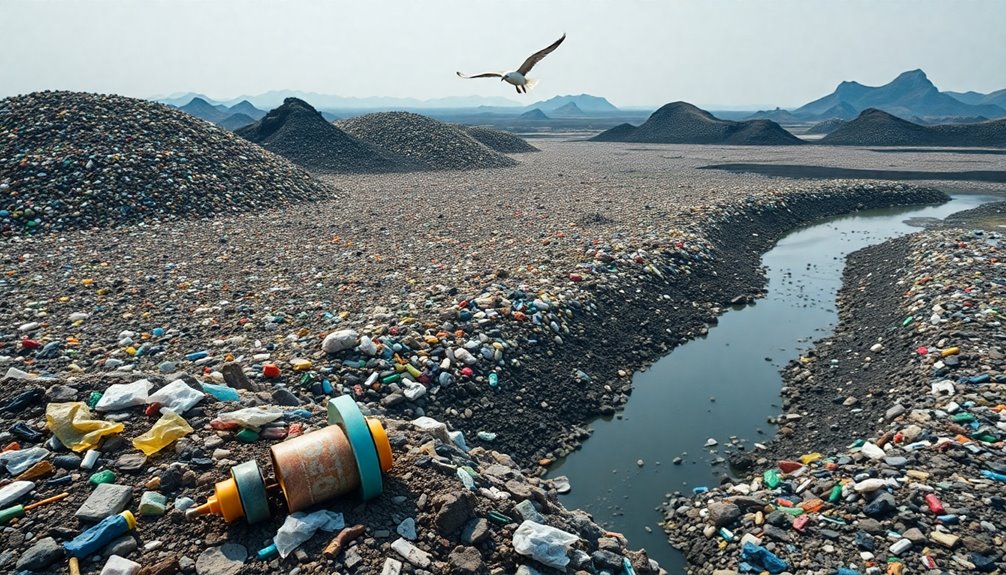The global waste crisis dramatically affects your environment, health, and economy. Every year, billions of tons of waste get generated, with over half being dumped openly. This leads to serious environmental consequences, like air and water pollution, harming wildlife and communities. Health impacts are staggering too, with millions dying from waste mismanagement annually. The economic burden is equally heavy, as ineffective waste management can cost billions. However, adopting strategies like the circular economy can mitigate these issues. If you want to understand how to combat this crisis effectively, keep exploring for practical solutions.
Key Takeaways
- The global waste crisis contributes to severe environmental degradation, with over 50% of waste openly dumped and hazardous emissions from incineration.
- Waste mismanagement results in approximately 9 million deaths annually, with vulnerable populations facing heightened health risks from pollution and disease outbreaks.
- Economic losses from wasted food reach $940 billion annually, while ineffective waste management costs could escalate to $640.3 billion by 2050.
- Marine ecosystems are disrupted by 19-23 million tons of plastic waste each year, leading to significant wildlife fatalities and habitat destruction.
- Implementing circular economy practices can significantly reduce greenhouse gas emissions, promote sustainability, and yield economic benefits exceeding $108 billion.
Waste Generation Trends

The global waste crisis is escalating, with annual municipal solid waste (MSW) generation currently hitting around 2.01 billion tons. By 2050, this figure is expected to soar by 70%, reaching 3.40 billion tons.
You might find it alarming that high-income countries generate about 34% of the world's waste while only accounting for 16% of the global population. The East Asia and Pacific region leads with 23% of global waste, highlighting significant regional disparities.
Per capita waste generation tells a stark story, too. The average person generates 0.74 kilograms of waste daily, but in the U.S., each citizen produces an astonishing 808 kilograms annually. Countries like Canada and Australia aren't far behind, demonstrating that high-income nations generate more dry waste, which is often recyclable. Additionally, it's noteworthy that organic waste constitutes around 44% of total waste globally.
Looking at regional trends, Sub-Saharan Africa and South Asia are experiencing rapid increases in waste generation, with projections showing waste could more than triple in these areas by 2050.
Sadly, over half of this waste is currently openly dumped, indicating a pressing need for better waste management strategies worldwide.
Environmental Consequences

Waste management isn't just a logistical challenge; it's a significant environmental crisis with far-reaching consequences. When waste is incinerated, it releases hazardous gases, heavy metals, and sulfur dioxide, which poison wildlife and local communities.
Meanwhile, plastic waste leaks into aquatic ecosystems, with an alarming 19-23 million tonnes entering our lakes, rivers, and seas annually. This pollution alters habitats and disrupts natural processes, making ecosystems less resilient to climate change.
You mightn't realize that waste disposal methods like burning or burying non-recyclable plastics negatively affect the health of nearby communities. Marine litter, for instance, kills millions of animals each year through entanglement or starvation, further destabilizing the balance of our oceans. The presence of waste facilities often located near low-income communities exacerbates health issues related to pollution exposure.
Implementing better waste management strategies can mitigate these impacts. For example, adopting circular economy practices can significantly reduce greenhouse gas emissions. By recycling materials, you save energy and lessen emissions.
Additionally, composting boosts soil carbon sequestration, enhancing our environment. In essence, effective waste management isn't just about disposal; it's about safeguarding our ecosystems and ensuring a sustainable future for all.
Health and Social Impacts

Mismanaged waste poses severe health and social challenges that affect communities worldwide. Every year, around 9 million people die from diseases linked to waste mismanagement, far exceeding malaria-related deaths. Open burning of waste alone accounts for 270,000 premature deaths annually and releases toxic substances into the air. This pollution can lead to serious health issues like heart disease, cancer, and respiratory illnesses.
Unmanaged waste creates breeding grounds for disease-carrying mosquitoes, spreading illnesses such as malaria, dengue fever, and yellow fever. Children, in particular, suffer the most, facing health risks like diarrhoea, stunting, and respiratory complications. Vulnerable groups, including women and under-nourished populations, experience heightened risks from exposure to persistent organic pollutants. Additionally, unmanaged waste leads to 40% of global waste being disposed of at informal dumpsites, further exacerbating health risks.
The social implications are equally concerning. Poor waste management often leads to flooding, exacerbating disparities in low-income communities and hindering educational opportunities.
With over 2 billion people lacking proper garbage collection, open dumping becomes common, increasing disease outbreaks. You can see how mismanaged waste not only impacts health but also strains community resources, making it crucial to address these issues for a healthier future.
Economic Implications

Addressing health and social challenges tied to waste mismanagement also reveals significant economic implications. If no urgent action is taken, the global annual cost of waste management could skyrocket to USD 640.3 billion by 2050.
In 2020, these direct costs were around USD 252 billion, but when you factor in hidden costs from pollution and poor health, the total reached USD 361 billion. Effective waste management could significantly reduce these expenses to USD 270.2 billion by 2050, while a circular economy model might net an additional USD 108.5 billion annually. Moreover, the projected rise in municipal solid waste illustrates the urgent need for better waste management strategies.
Waste pollution also impacts property values and tourism. Contaminated land drives down real estate prices and affects the attractiveness of landscapes, leading to lower tourist numbers.
For instance, Queensland spent over $59.4 million managing litter in 2018/19. Additionally, about a third of the world's food is wasted each year, resulting in a staggering $940 billion in economic losses.
Strategies for Improvement

Improving waste management requires innovative strategies that tackle the root causes of waste generation and promote sustainability. You can start by combating food waste. Redistributing surplus food to marginalized communities, like in Vallès Occidental, Spain, can make a significant difference. Additionally, consider recycling food waste, such as turning cassava peels into animal feed in Nigeria, and advocating for policies that minimize food waste in supply chains. Implementing solar-powered irrigation systems can enhance crop yields and further reduce food waste.
Addressing textile and electronic waste is crucial, too. Encourage long-lasting products through effective policymaking and support extended producer responsibility. Promote repair services for textiles and electronics to keep them in use longer. Less than 1% of clothing material is recycled, which highlights the urgent need for change in the textiles industry.
Reducing water usage in textile production is vital, as it currently equals 86 million Olympic-sized swimming pools annually. Enhancing waste management infrastructure is another key strategy. Modernize waste collection processes to boost recycling and composting rates. Invest in simple collection and sorting systems, and establish efficient waste collection routes using accurate data.
Finally, adopting circular economy principles can reshape consumption patterns. Reduce plastic use, promote alternative materials, and support international agreements aimed at cutting down plastic pollution. Investing in renewable energy technologies can also enhance sustainability efforts and reduce waste in energy production processes.
Frequently Asked Questions
How Can Individuals Reduce Their Personal Waste Generation?
You can reduce your personal waste generation by making simple changes in your daily routine.
Start using cloth napkins instead of paper towels, and switch to reusable water bottles and shopping bags.
Compost your food scraps and plan meals to minimize waste.
Repair or donate electronics instead of discarding them, and opt for second-hand items when possible.
Finally, choose products with minimal packaging and use real dishes instead of disposables.
What Role Do Businesses Play in Waste Management Solutions?
Businesses play a crucial role in waste management solutions. By implementing sustainable practices, you can reduce waste generation and improve waste segregation.
You'll need to comply with environmental regulations and engage your supply chain partners for collective impact.
Utilizing technology can optimize collection and disposal processes, leading to cost savings.
Moreover, by adopting recycling programs and community partnerships, you enhance your brand reputation while contributing to a healthier environment.
How Does Waste Management Differ Between Developed and Developing Countries?
Waste management differs significantly between developed and developing countries.
In developed nations, you'll find better infrastructure, strict regulations, and efficient recycling systems, allowing for effective waste disposal.
Meanwhile, in developing countries, inadequate infrastructure leads to open dumping and poor waste management practices. This results in environmental and health issues.
You can see that high-income countries focus on reducing inorganic waste, while low-income countries struggle with managing biodegradable materials.
What Innovative Technologies Are Emerging in Waste Management?
Innovative technologies in waste management are transforming the industry.
You'll find smart waste bins that use AI to sort and compress waste, optimizing collection routes. AI recycling robots efficiently identify recyclables, improving accuracy in the recycling process.
Pneumatic waste pipes transport waste underground, reducing environmental impact, while solar-powered compactors minimize trash volume.
Integrated waste management systems analyze data to enhance operations, ensuring that waste management becomes more efficient and sustainable overall.
How Can Communities Engage in Effective Waste Management Practices?
To engage in effective waste management, you can start by organizing community clean-up events and workshops that educate everyone on recycling and waste reduction.
Create a neighborhood recycling program with clear instructions and provide convenient bins.
Encourage local businesses to adopt sustainable practices, like reducing packaging.
You could also promote events like swap meets to reuse items.
Conclusion
In conclusion, addressing the global waste crisis is crucial for our planet's health and our communities. By understanding waste generation trends and their consequences, you can take action to mitigate environmental damage and improve social well-being. Embracing innovative strategies and supporting sustainable practices not only benefits the economy but also fosters a healthier environment for future generations. Together, we can turn the tide on waste and create a cleaner, more sustainable world for everyone.







